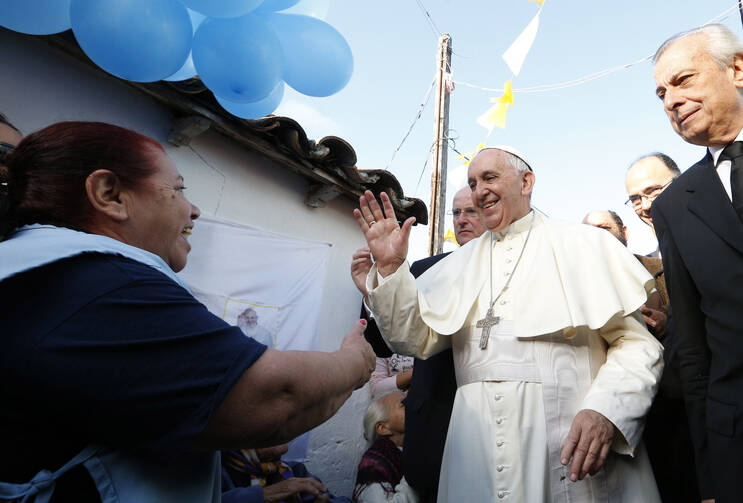Pope Francis has spent much of his papacy embracing people. He’s visited slums and welcomed immigrants; he’s worked to include people from the margins and made an effort to live a simple, humble life. This has made a lot of us feel pretty good about him and about the church. “Ours is a church that cares about the poor! Ours is an inclusive and loving church! Just look at our pope!” we cry. The ubiquity of these images of the pope and his lived expression of the Gospel have in some ways allowed us to think that he is in the process of single-handedly solving the world’s problems. This is a comforting thought. But while Pope Francis is trying to encourage a more just, generous and merciful world, he isn’t planning to do this on his own.
Over and over Francis has called each of us to join him in caring for the poor and the sick, to visit prisoners, to help those who are homeless, to embrace others and to reconsider how we build our society, how we spend our money, time and resources. And it seems the world is beginning to realize that all the hugging and the talk of the poor and vulnerable and the economy is not a papal PR campaign but an authentic call to live a Gospel that might just require the rest of us to (gasp!) change our lives. And that’s making many people uncomfortable.
A recent Gallup poll reported that Francis’ popularity has fallen steeply among U.S. adults (76 percent favorability in 2014 to 59 percent in 2015), and particularly in conservative circles (72 percent favorability in 2014 to 45 percent in 2015). A Gallup analyst suggested that this may be “attributable to the pope's denouncing of 'the idolatry of money' and linking climate change partially to human activity, along with his passionate focus on income inequality— all issues that are at odds with many conservatives’ beliefs.” Yet urging care for the poor and the earth is nothing new for the church, which has been on message about this for some time. Francis didn’t invent these ideas, he’s just made them harder to ignore.
Perhaps this discomfort is to be expected, given the nature of how we receive and filter information today. Despite the millions of websites, apps, blogs and social media pages that allow us to express our beliefs or to learn more about others’ we can still arrange our news feeds so that we never hear from those voices with whom we disagree. Pope Francis,’ in his message for the 2014 World Communications Day, wrote:
“The variety of opinions being aired can be seen as helpful, but it also enables people to barricade themselves behind sources of information which only confirm their own wishes and ideas, or political and economic interests.”
In other words we are used to hearing opinions and voices that we “like,” and can easily avoid anything that we dislike, which too-often is synonymous with what challenges us. This inclination is understandable, but each of us should work to resist it. True dialogue can be difficult and painful. But a lack of dialogue is worse. When we are unwilling to truly encounter and consider opinions that challenge us, it becomes all too easy to label the individuals who hold those opinions as enemies or opponents—to view them unfavorably. And after surrounding ourselves with words of affirmation, the challenge that Francis offers us might be that much harder for us to accept.
True dialogue requires humility. If we want to respond to the Gospel call to mercy, we have to be willing to acknowledge that this call might summon us to unexpected places, and might come from someone very different from ourselves. It might jar us, challenge us, surprise us. And we might not like it.
Most of us like to think that we do our best each day to be good people, or good Catholics. We go to work and care for our families and maybe watch some Netflix and say our prayers before bed. And maybe most of us really are quite literally doing all we can with the time we have. But if we’re honest with ourselves, most of us can do something more. For some of us that might mean seeking out volunteer opportunities that help us to connect with those in need, or donating food or clothes or money. But this “more” can also mean simply being more present and deliberate in the good works we already do—acknowledging and lifting up the hours worked, the meals prepared and the rides to soccer practice as moments of mercy in and of themselves and seeing these everyday moments as opportunities for true encounter and real grace. The Gospel is meant to challenge our daily actions as well as our hearts. And it is quite literally Francis’ job to remind us of that, like it or not.








